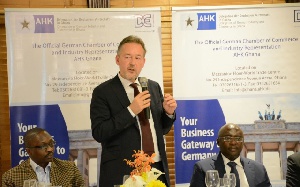 Christoph Retzlaff, German Ambassador
Christoph Retzlaff, German Ambassador
Mr Christoph Retzlaff, the German Ambassador says the G20 Africa Partnership Compact is an avenue for renewing cooperation and enhancing sustainable economic development in Africa.
Launched under Germany’s Presidency of the G20, the Ambassador explained that the Partnership would support reliable financial frameworks in order to increase investment opportunities, push for a more sustainable infrastructure as well as create jobs and employment.
Addressing a media conference, on Thursday, Mr Retzlaff stated that it would contribute to the realisation of the African Union’s Agenda 2063.
AU’s Agenda 2063 is a strategic framework, which seeks to build on past and existing continental initiatives for accelerated growth and sustainable development over the next 50 years.
The German Government, therefore, aims to boost political and economic stability in Africa through the G20 Africa Partnership.
Ghana, Tunisia, Côte d’Ivoire, Senegal, Rwanda, Morocco and Ethiopia are partnering the Group of 20, an international forum for the governments of 20 major economies.
The International Monetary Fund (IMF), the World Bank and the African Development Bank are the other partners of the G20 Africa Compact.
Africa is deemed as a key player in the 21st Century with its economic development and population growth having a huge global impact.
“This is why the German Government made Africa one of the priorities of its G20 Presidency” Mr Retzlaff said.
Mr Retzlaff explained that, the partnership intended to support related political initiatives of the G20 and facilitate joint commitments in the form of investment compacts between Africa, G20 Partners and the International financial institutions.
The media conference was held by the Ambassador to explain the frameworks of the G20 Africa Partnership and the opportunities presented by the Compact.
Mr Retzlaff said the compacts would be designed to be demand-driven and form the basis for long-term cooperation, with the aim of creating a sound investment climate in the relevant sectors of the selected African economies.
He explained that three out of the seven compact countries - Ghana, Cote d’Ivoire and Tunisia - would additionally enter into a reform partnership with Germany, which also promised additional support capital to them.
He said these countries were selected under the partnership as they stood out with regard to their reform-oriented policies that had a strong focus on transparent budgets, fighting corruption, promoting democracy and realising economic reforms.
He said furtherance to that reform partnership, Ghana signed a declaration of intents with Germany on the sideline of the just-ended Berlin Conference that would attract an additional 100 million Euros each year, to be used mainly for projects in the renewable energy sector; vocational and technical training; as well as the financial sector, this year.
The Ambassador explained that the G20 acknowledged its special responsibility to join forces in tackling the challenges facing the poorest countries, especially in Africa, and so the Compact would boost private investments and investment in infrastructure as these were essential precondition for attaining strong, balanced and sustainable growth.
The G20 would provide political support for comprehensive, country-specific packages of measures and would give African countries a platform to showcase opportunities and conditions for investment.
It is open to all African countries that are interested in improving their frameworks for private investment on a durable, sustainable basis.
Mr Retzlaff said Germany had decided to reduce from 10 per cent to five per cent the deductible guarantees for German companies that would invest in the Compact countries.
Mr Henry G. R. Kerali, the Country Director of the World Bank, emphasised the need for Ghana to create conducive investment environment for foreign investors.
He said the World Bank, the IMF and the African Development Bank would provide guarantees that would encourage investors to put their money in Ghana.
“The objective is not to create unfair competition for local firms but to create a level playing field,” he stated.
Mrs Natalia Koliadina, Country Representative for IMF, said the role of the IMF was to help Ghana improve its macroeconomic structures.
The Berlin conference, dubbed "G20 Africa Partnership–Investing in a Common Future", which was held on 12th and 13th June, brought together the President of the African Union, Heads of States of African countries, including President Nana Addo Dankwa Akufo-Addo, the Presidents of IMF, World Bank, Africa Development Bank and the German Government.
Participants at the G20-Africa-Conference explored new investment opportunities in Africa and discussed how new incentives for more private-sector investments, sustainable investments in public infrastructure and economic participation could be created.